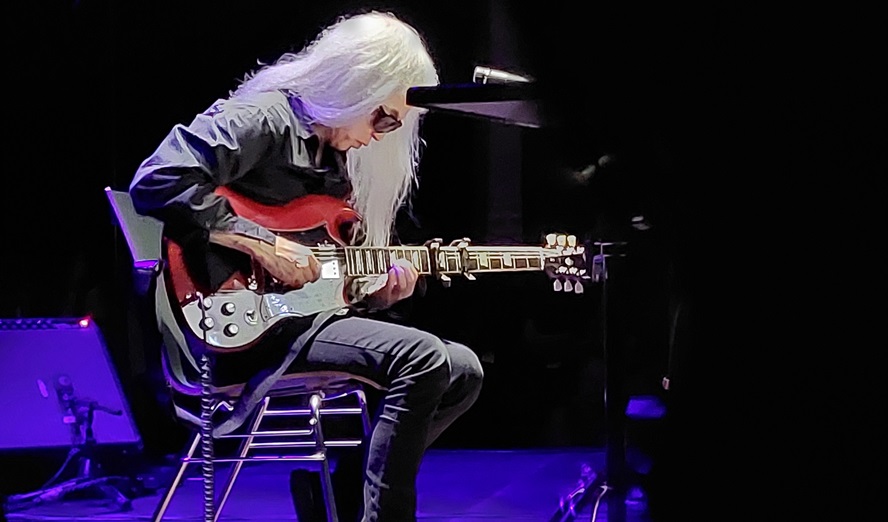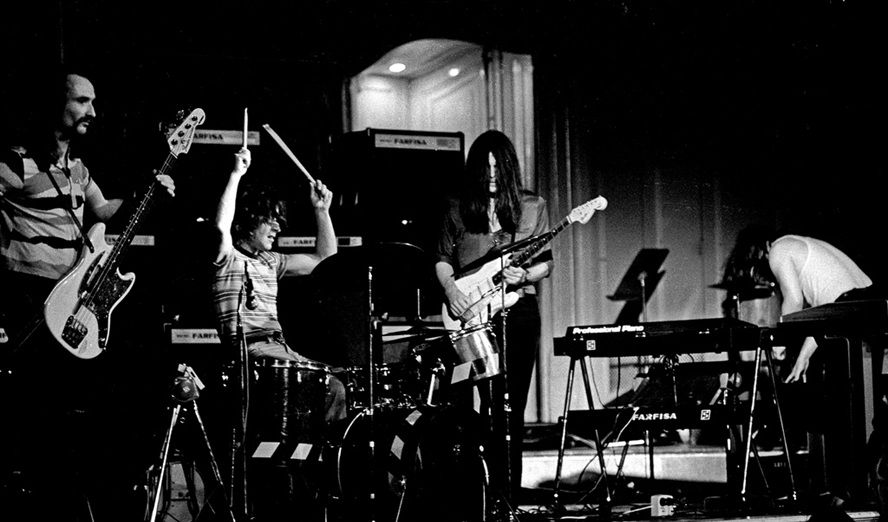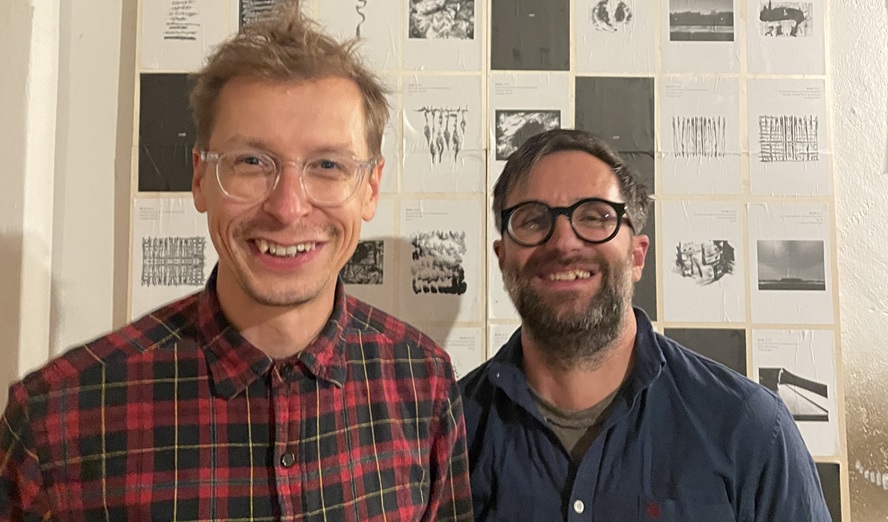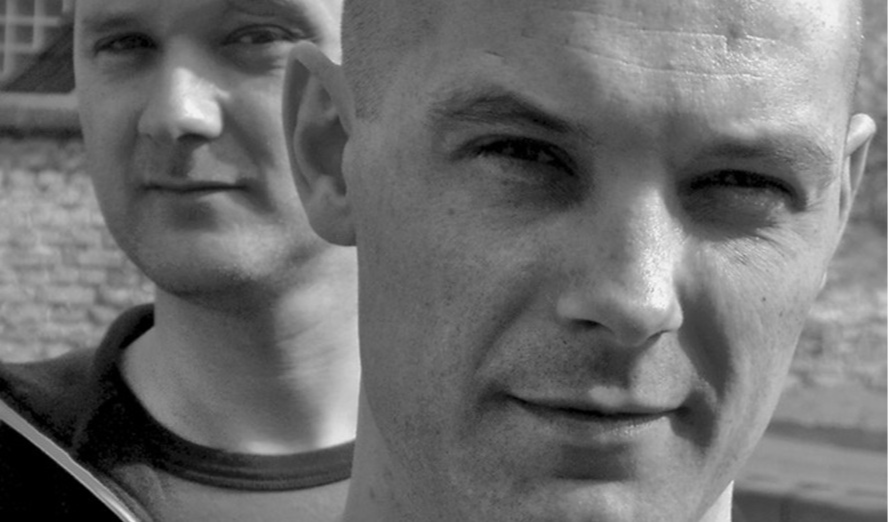On a hot August afternoon, prior to playing his second gig at the 2024 iteration of A L’Arme music festival in Berlin, Keiji Haino and his interpreter and assistant for the week, guitarist Shouji Hara, welcomed skug for an interview. Thanks to Karina Mertin, female partner of the festival’s curating duo, the guitarist had received the main points of the questionnaire via email and amiably agreed to answer them in person. Backstage at the famed Radialsystem building, the string of questions evolved into an enthusiastic, multilingual conversation about music, instruments and the energy thereof. Transmission is the mission in this next instalment of skug’s Japonoiseries articles, serving up two sides of a coin: Keiji Haino by night in full music regalia playing not one but two sets of concerts during the festival – and Haino-san the mirthful elderly gentleman in the sunlit studio. Boy, what a difference a day makes.
After the first gig, I was partly surprised and shocked by the sound – like Haino-san mentions, smirking, that he likes to present to his audience different types of loudness and that, I understand, has been duly recognized. Haino-san is a person petite in size, and he doesn’t like to be looked down upon (especially so from noses of airport personnel, securities and other big goonies) – but he will also come down on his knees to make one of his intricate phono-philosophical points perfectly clear. He did so when he was explaining the necessary layering and stacking of sound and the bandmembers’ claims to parts in the session – who plays the bass, and who the guitar? And who is the base? He would, sure enough, move mountains (albeit of sound) to make you see the light of sonic recognition – what is important and what’s not – as a willing disciple, you cannot fail to adapt to his views and feel the appeal of such a teacher. And he did, indeed, create those landscapes of drone, echoes of darkness, slamming riffs that opened the space, that I came for during that evening’s gig.
A concert experience like no other
If ever I had an eargasm, it happened there, at the second Haino-gig. When it was almost too much to bear, the sheets of heavy riffs challenging brainwaves, the air thick as smog with chords, a massive wall of sound, he took it one step further – to a note you’d never have expected. That is why he is a demigod, master of the guitar. Eager foragers who have heard it all, remember most of what has been presented to their ears, conscious of what brings the groove around, unfazed by normal licks and lyrics. Sated and sedated by popular sounds, seeking the unknown, longing – although enjoying the well-known roads – for a view they had not foreseen and not imagined. That is where Haino will lead. If one can bear to listen, because he will offer a glimpse into the end of this (and the next) universe – all galaxies of songs have ended, all black holes sucked up the rest of reverb, all samples have run out. Look back, and see your favourite records crumble to dust, long ago you have heard them too often anyways. He stands on stage, unfathomed, unwavering, black-clad, silent, pursed lips, white mane, bespectacled eyes unseen but surely uncanny, guitar slung round the shoulders. And smiles.
Finally, you see what this man is facing every time he performs. The end of music must be frightful to such a seeker of its depths and lover of its essence. And be on your guard, the still, friendly old man holds this love for music with a fierce strength. Should you disrespect it, you will surely find yourself on the way back to humble songs of meek power. What truly nourishes your soul lies beyond your grasp now. Until you can stand in this darkness again. Where all light fades, the comfort of night changes what you must know. Don’t underestimate that man, but don’t put him on a pedestal either. After all I have said? Yes, the respect is real, but the greatest person is s*he who can stay on the level of humanity, and to go over the top and make it back to the ground. To do so, often, and to play it all again. That’s what this personification of music was meant to do – and to bring it to your heart’s awakening, until your ears will ring.
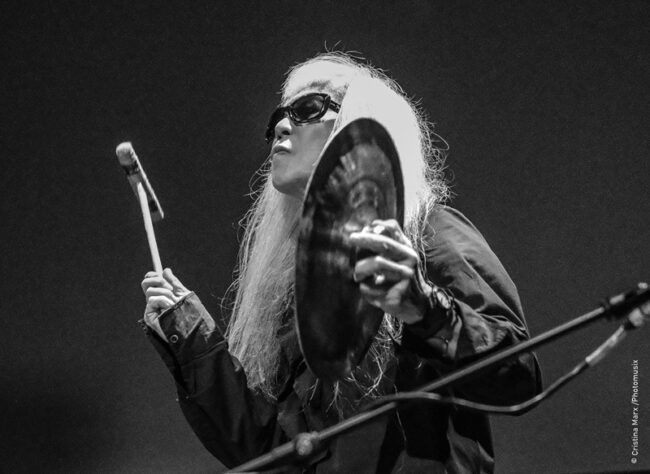
Two days later, on said hot August afternoon, I met Haino-san and Hara-san at Radialsystem for the following interview, about fellow musicians he performed with, instruments he likes to try out and the experience of performing. The answers were mostly given in Japanese which Hara-san kindly translated for skug ensuite. Haino-san speaks English as well – mostly using it for emphasis though.
skug: The first question: Is there an instrument that you have not played yet, but would love to try? For example, the West African Kora? You have played the lute and the harp, and the Kora is considered a combination of these two instruments.
Keiji Haino, having been listening with intent, sits up straight and answers, promptly, that the Kora’s sound is too light, he needs something more substantial. More bass-sound is more suitable to him, so he would rather try the Beganna, an Ethiopian instrument. Haino-san describes it as a heavy item much like a grand harp, immediately reproducing its sounds to give an idea of what the instrument sounds like: I’ve since checked it out on YouTube – it seems to be a very traditional instrument, sounding pre-medieval, creating broad, humming tunes, drones even. Haino-san switches to English, stating that it has very strong, thick strings, and is mainly played at church services or functions of the high society. And, so I am told, it is rather expensive, being sold for more than two thousand Euros, and not a cent cheaper. Haino says if I know someone who sells a Beganna to let him know – I’m thinking maybe the Ethiopian embassy in Tokyo could help, or some sort of cultural institution? I state that I’ve only ever seen such an instrument in a museum, it’s a biblical object even, lore has it that David played it to King Saul. Haino-san points out that he needs the vibration from the instrument – I’ve heard similar statements from a female bassist and agree that the Kora might be too light when it comes to Haino’s signature sound from recent recordings. But when I remember songs like »Koko« or »Fuwa Fuwa«, I’m not so sure anymore, they contain pretty light, changeling sounds.
You have worked with many different musicians around the world, would you like to tell us about your concerts with the late Peter Brötzmann? How did the connection work, being two strong musicians, both of you. What made your connection so harmonic?
Haino-san says both of them thought that the genre is F U C K. The followers of Peter Brötzmann are of course Jazz and Free Jazz lovers, who don’t really listen to a lot of rock music, to which Haino-san is on the other hand very strongly connected. Which was the point that Peter Brötzmann was very interested in. They both enjoyed playing in lots of different genres. He states that trust was the strong part of their relationship. Peter Brötzmann and himself quite enjoyed the surprise moment. Agreed. The audience also realizes and enjoys these surprise moments and responds accordingly. The to and fro of these processes seem to be of essential meaning to Haino-san. He states it’s obvious, of course, that the audience recognizes what’s going on, and says it was never boring to play with Peter Brötzmann. And they never grew tired of playing that style of improvisation either, like it has been known to happen with other improvising musicians. Hell, they didn’t even need soundcheck when they played together.
Playful, mischievous moments seemed to have kept their relationship lively. They played tag, musically of course, with Haino-san taking over the more boyish part, of a fashion, to Peter Brötzmann’s part of Free Jazz seignior. Moments like that include Haino-san taking out a Ciaramella (known in German as a »Schalmei«) and startling Peter Brötzmann, or Brötzmann asking Haino-san to turn his amp down, which resulted in turning it all the way down to the point of using his electric guitar like an acoustic instrument. He states that there are a lot of meanings about big sound, of course there is the physically big sound – and to him there exist different meanings of loudness, that he wants to show the audience. To which I heartly agree, Keiji Haino showed quite the variety of pleasurable impacts of loudness, albeit not without making one fear for ones’ ears.
It’s delightful to have a real conversation with these kind of musical musings. However, to some readers this might be just some snobbish exaggeration of amplified prowess. But the man has got a point, for example about the loudness – although often using his loudness to such a shocking effect. The second concert – had more of that soundscape loudness that people also enjoy with Sunn O))) – of which one Stephen O’Malley has been known to perform with this white-haired Japanese lord of the lute. And here, the loudness creates a kind of depth for people to listen into.
In remembrance of Kamekawa-san, I listened to a lot of his music, also of course when he played with you in Fushitsusha. His style of playing bass then was quite different from his other collaborations, say Gaseneta or Yura Yura Teikoku. What do you look for in a bassist for your band, you have had different bassists in your band, so what is important? (Hara-san asks me to specify – only with Fushitsusha or collaborations as a whole? – and I stick with Fushistusha, which is probaly more concise to answer…)
Haino-san says he wants to have a bassist as a base in his band, not just to play the bass guitar. He thinks there is a difference between the bass in a band and the bass guitar per se (It was difficult to discern what was really the meaning of Haino-san’s words, what with the words sounding so similar, and also »lost in translation« might have played a part, but this is what I understood from what was being said and shown), stating that there are lots of people who can play the bass guitar, but no one who can play the base. It becomes apparent that he is talking about the fundament and the functionality. This I suggest as the compromised meaning of his words and it’s greeted as the right explanation, needless to remark that this rather is a philosophy.
The collaborators who want to play with Haino-san often try to do different things – Haino corrects – new things! To which Hara-san admits that »new thing« is a difficult expression. It is agreed that »a new creation« is what was meant to imply both musicians wanting to create something new. If the bassist wants to create something new, however, with Haino-san, most of them will try to do a top-part, or layer, of this new creation. All in all, it leads to the bassist becoming more like a guitarist. He says that his music changes the stability of instruments – guitar, bass and drum, their parts become interchangeable. But there’s no need to have three guitar players (now what would Mr. Branca have to say to that?). So, Haino-san adds a different value of quality or function to the guitar, instead of switching parts himself. But there are definite – albeit early-on – examples of bassist-starring mainstage moments in Fushitsusha, including rumbling riffs galore in Tokyo’s UFO-club. So, he concludes, at that point in time, if you change your instrument, no one can play the bass, says Haino-san – except Chiyo Kamekawa.
Both gentlemen are now talking about music as something rather more substantial than the aethereal motions of air that reach our ears. And to demonstrate, Haino-san gets down on his knees to enhance the fact of bass-necessity by slapping the floor, then the table and setting a bottle on the table’s surface with careful emphasis, to make clear that without the base, none of these would be able to fulfil their respective means. Even if there is a bottle, and a table, without the floor they cannot stand. Which is interesting as a comparison, because until that day I thought it was agreed that the drums were supposed to lay fundaments for songs. Lots of people, he says, forget about the floor, and the bass.
He states that before Renaissance music, the players could change every part. Haino-san would like to encourage people to learn more about medieval music – does he know that middle European children grow up with traditional songs from back when the first Christmas carols appeared, »Es ist ein Ros entsprungen« or »In dulci iubilo« included? But he unfurls further theory, that dwells on music before capitalism hit home. Better to play real music than to say something anti-war or protest statements, he declares. (Critical side-eye: I can only agree half-ways, there was a lot of good music around during the hippie era. But as an ardent Stooges fan, lover of punk attitude and noticing that a good deal of old 68-generation folks are now turning into old white reactionaries, maybe it would be better for musicians to stick to their guns? Maybe the message shouldn’t interfere with the art, and left for better judgement to people not so occupied with vibing? But good music can lead people to think about the important messages that life has to teach us, and I’m all here for that. If those are love, peace and happiness, who’d I be to declare them wrong?) Haino-san says that art is always trying to realize something, which, to him is the real purpose of art and music. The more you know about music, as a player, the better the connection, because you can more easily understand the function of music itself. The deep point is important – I guess we’re back at the base of things.
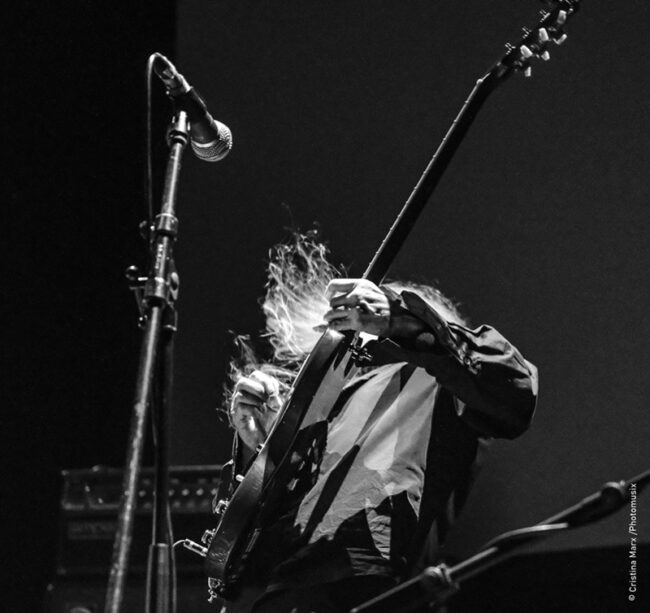
Haino-san, the world is changing ever more rapidly, small music venues are forced to close down, festivals cease to exist. You have a lot of experience through your travels, physically and musically. What gives you strength?
Haino-san mentions that the guests to his music, his audience, enjoy his music and he senses the excitement, giving him strength and power. Which is interesting, I reply, that we feel like it’s the other way round, like we are receiving his excitement. To which he states simply: it’s a give and take. He says, of course you have to try your best, every single time. Always, they both say, Hara-san and Haino-san.
Last question: ありがとうfor coming back to A L’Arme festival! What was it like for you, playing the first time at the festival in Berlin 2012?
Haino-san asks for the line-up of the first festival. I remember that Peter Brötzmann had been on the list as well. After I summon the page on my phone, I hand the device over to him, and he seems to be astonished to find Akitaka-san’s name there. Caspar Brötzmann was also already on the line-up then as he was this year. However, Haino-san states that he has no particular recollection of his performance. Instead, it was established that as per usual, Haino-san gives his all on stage, a hundred percent, all of his energy is spent and he tends to forget after the show.
Bonus question: you have played at the Wels Music Unlimited Festival 2011 – will you return there as well? (Wels Unlimited heed my call…)
He says he will come and play anywhere, anytime. But would prefer if a different method of travelling was at hand. Haino-San had flown in directly from Tokyo to participate in the A L’Arme festival, and he jokingly says that as an easier system of travel though – teleportation would be best. So I mention Anton Zeilinger’s approach, which brings him to say »it’s getting real«. He sees no reason not to come back to Europe, which rings true since Haino-san will be back to play in Poland at the end of September 2024. Whilst musing about festivals, I mention Bo Ningen at Klangfestival, and Luke Stewart, bassist of Blacks’ Myths, who was also present at A L’Arme festival.
We go on to talk about the fact that he is a cat-lover, about different breeds, how he detests the pedigree of animals leading to malfunctions, and wildcats in Austria. We are having a genuine, pleasant, cheerful conversation. About how he has a small garden with a big pet carp in it. But even if he likes to have a quiet time at home, he is very lively for a septuagenarian and keeps at it, playing full of energy and spirit, hoping to yet do that for many years to come. That maybe answers the question about strength. Just keep doing whatever you are good at and what you like best? Probably a form of Ikigai, I reckon.
We conclude the interview with a question from Haino-san himself, asking about second-hand record stores, if I could recommend some in Berlin. Strange music, it was required, and Hara-san and Haino-san both had already visited six different record stores. Not having had time for record hunting myself, I pulled in some information, and lo and behold, they managed to visit Bis aufs Messer Records after the interview and before the show in the evening.
So, Keiji Haino recommends getting into medieval music, ecclesial music even. If anyone of our esteemed readers knows how to deliver a Beganna to Haino-san, we’d be happy to oblige and establish contact. As to Haino-san’s character? He proved to be a witty, charming elderly gentleman. Off stage. At that moment. On stage? Come see and hear – you might just witness darkness and raw energy, grand discoveries yes, but brace yourselves. He might blow the Schalmei at you!
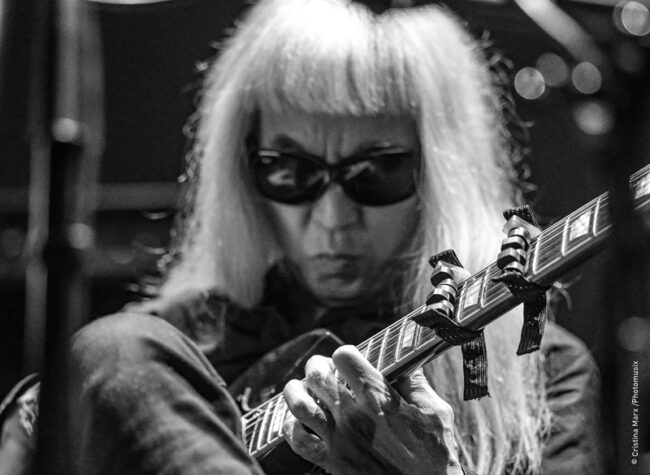
Japonoiseries (»Japon«, »noise« and »series«) is a 4-part series about Japanese noise and psychedelic music. The next parts will be dedicated to Yura Yura Teikoku and Les Rallizes Dénudés.
For more info on Keiji Haino’s touring schedule, visit www.fushitsusha.com or Haino-san’s Instagram page or Facebook page respectively. He will be playing some shows in Poland, for example at Unsound Festival, at the end of September 2024.
